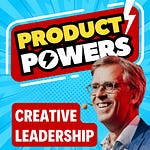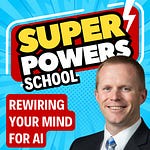Have you ever fluffed your lines when you met someone you admired? Maybe a famous personality or an influential leader? Well that’s exactly what I did in this episode.
I’ve been a long-time admirer of Henrik Kniberg’s work. He re-wrote the rule book when it comes to the way Agile teams work together.
His YouTube videos have had millions of views, and his work at Spotify, LEGO, and Mojang (the people behind the Minecraft game) shaped how entire industries think about Agile and product development.
So having him on the podcast was a big deal. I was nervous.
Henrik’s latest video, “Generative AI in a Nutshell,” has clocked over 3 million views. As a visual thinking practitioner myself, I have to say, it’s a masterclass in visual storytelling. And he’s recently turned the video into a book with the same title.
📚 How the Book (and Viral Video) Happened
Henrik didn’t plan to write a book.
It started with a sketch. Literally.
He sat in his cabin, grabbed his pen, and made a video about what he’d learned after a year immersed in AI. That 18-minute video exploded. Millions of views later, people wanted more. So he expanded the insights into a book — still filled with doodles.
“I wanted to show people that this stuff isn’t magic. It’s learnable. And it can give you superpowers.”
🦾 From Chatbots to Colleagues: What Are AI Agents, Really?
Henrik explained the difference like this:
A chatbot is like an intern who sleeps at their desk until you poke them.
An AI agent is like a teammate who knows their job, checks their email, flags issues, and just… gets on with it.
One of his clients built an agent that screens thousands of investment opportunities a year — faster and more consistently than any human. Not just saving time, but actually making better calls. Why? Because AI doesn’t get tired, distracted, or bored.
And you can talk to these agents like you would a junior human team member:
“Here’s what you need to do.”
“Here’s how we handle exceptions.”
“Let me know if anything weird comes up.”
🧑🤝🧑 Two Humans and an AI Walk into a Standup...
With the rise of AI Agents, I was keen to explore the future of Agile teams. In fact, I’ve been inspired by one of his articles on the topic titled “Agile in the Age of AI”. I also recently wrote a blog article on the subject of whether AI is making Agile teamwork obsolete.
According to Henrik:
“You don’t need a six- or seven-person Agile team anymore. If you understand how to work with AI, two people and a few agents can get the same — or more — done.”
Two people and some AI agents. That’s it.
That may sound like something out of a science fiction movie. But Henrik’s already living it. He’s building AI platforms where small teams — sometimes just a developer and a customer co-create with agents that can triage bugs, write code, route invoices, and research competitors.
The coordination cost drops. The team size shrinks. You ship more. And no more lengthy boring meetings.
🧑💼 So What Do Humans Still Bring to the Table?
We still have an important role. But it’s changing.
Henrik made it clear: if your value at work is just gathering data, running reports, or managing processes, that’s the kind of stuff AI will easily take over.
But if your skill is framing the right problem?
If you know how to make decisions with messy data?
If you’re great at talking to real people and spotting nuance?
Then there’s less risk of you becoming redundant.
Especially when the AI can help with the heavy lifting — pulling insights, generating options, summarising articles — leaving you more time to think, sense, and steer.
Henrik put it best when he said:
“You become more of a problem-formulator than a problem-solver.”
📉 Why AI Is Making Discovery Even More Important
AI makes it easier than ever to build products… but that also means more bad ideas will get built, faster.
Henrik’s seen it firsthand. It’s not the tech that makes the difference — it’s how close the team is to the real users. That’s where the magic happens.
At Spotify, it was about rapid releases and user data.
At LEGO, it was sitting with kids, watching them play.
At Mojang, it was livestreams and raw player feedback.
Whatever the method, the principle was the same: ship small and listen hard.
AI doesn’t change that. It just lets you iterate faster. In fact, Henrik now sits next to users and co-creates with them live — building working code in real time based on their feedback.
🧠 And What About Agile?
Henrik still believes in the values behind Agile — small teams, fast feedback, working closely with users. But the events? The roles? The team sizes?
All up for debate.
“When you’ve got two people and an AI, you don’t need sprint planning or stand-ups. You’re just talking all the time. It’s continuous flow.”
He’s not saying get rid of everyone. He’s saying we need to rethink how teams work — and stop organising around the constraints of the past.
🚀 So What Should We Learn Now?
According to Henrik, the biggest risk isn’t AI replacing jobs.
It’s people not adapting. Not learning. Not experimenting.
“If you don’t know how to use this stuff, you’ll struggle. Like trying to work today without knowing how to use the internet.”
Learning AI doesn’t mean becoming a prompt ninja overnight. It means being curious. Tinkering. Playing. Asking better questions. And yes — using it to think better, not just do faster.
Henrik learns by building, teaching, writing, and running into roadblocks. And he says the people who thrive in this new world will be the ones who are willing to experiment — and learn out loud.
✂️ And If He Could Abolish One Thing From Work?
Time sheets.
“They’re a waste of time — literally. You spend time filling them in, someone spends time reading them, and nothing useful comes from it.”
He even wrote a whole blog about how he got rid of them as a CTO. (And now I’m wondering how I can forward that to my manager.)
🎯 Final Takeaway
The way we work is about to change — faster than we expect. And we don’t need to fear it. But we do need to get ready.
Smaller teams.
Smarter tools.
More meaningful human skills.
If you can talk to users, shape a problem, and work out what matters — you’ll be ok.
👣 What to Do Next
📕 Grab Henrik’s new book: Generative AI in a Nutshell (yes, it’s full of hand-drawn doodles)
💬 Message me on LinkedIn and tell me your thoughts on this episode.
And if you want more human-first insights like this, sign up for the Superpowers School newsletter. I don’t promise to fix your time sheets. But I might help you build the skills that matter next.
Guest: Henrik Kniberg
Henrik Kniberg is Chief Scientist and cofounder of Ymnig.ai. He is an AI whisperer, trainer, product developer, and author. He created the viral video "Generative AI in a Nutshell" and the book with the same name. He is also famous for his videos "Spotify Engineering Culture", "Product Ownership in a Nutshell", and for silly metaphors such as the skateboard metaphor for product development, and for his work as Minecraft developer. He lives in Stockholm with his wife and four kids and a bunch of random music instruments.
Links: www.abundly.ai











